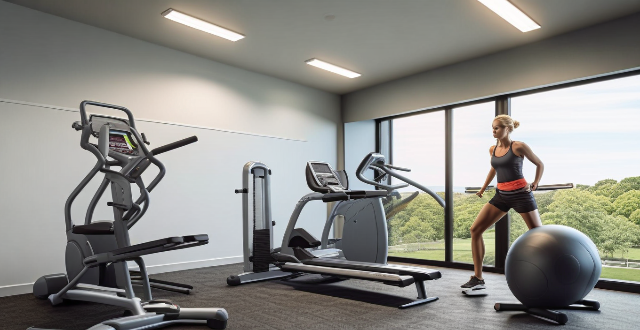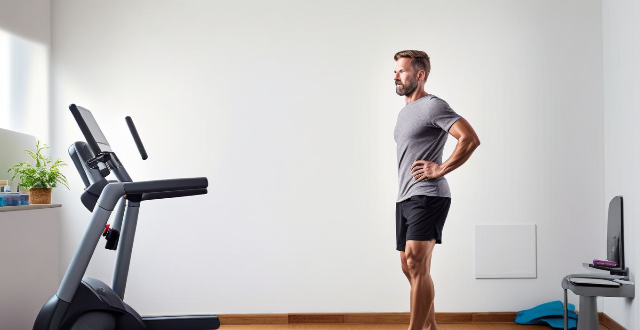Exercise Sleep

Does exercise increase deep sleep ?
Exercise can increase deep sleep by promoting thermal downregulation and improving sleep efficiency over time. Regular exercise is recommended to enhance sleep quality, but timing is crucial to avoid sleep disruption.

How does exercise affect sleep quality ?
Exercise is crucial for maintaining a healthy lifestyle and has a significant impact on sleep quality. Regular physical activity can improve sleep onset, increase deep sleep, reduce stress and anxiety, regulate body temperature, and promote better breathing during sleep. To incorporate exercise into your daily routine, start slowly, choose enjoyable activities, schedule workouts, mix up your routine, be mindful of timing, listen to your body, stay hydrated, get enough rest, seek support, and track your progress.

Does consistent exercise regulate sleep patterns ?
Consistent exercise has been shown to have a positive impact on sleep patterns, helping regulate the body's internal clock and increase the production of sleep-promoting hormones. Regular physical activity can lead to better sleep quality, reduced stress and anxiety, and improved overall health. To reap these benefits, it's important to incorporate regular exercise into your routine, starting slowly and gradually increasing intensity and duration over time.

How does exercise affect sleep patterns and quality ?
Exercise significantly influences sleep patterns and quality. Immediate effects include increased alertness and better body temperature regulation for sleep. Long-term, regular exercise improves sleep quality and regulates sleep patterns. Different types of exercise—aerobic, anaerobic, and mindful movements like yoga—all positively affect sleep but may require varying recovery times. The timing of exercise is crucial; morning workouts set the day's tone with minimal sleep interference, while late-night exercises can hinder sleep preparation. Tailoring workout routines to individual needs optimizes rest and overall well-being.

Can excessive exercise lead to sleep disorders ?
Overtraining can cause sleep disorders by disrupting normal sleep patterns and causing physical stress and fatigue. Relaxation techniques such as meditation, yoga, or deep breathing exercises can help calm your mind and body before bed. Adjusting your exercise routine and creating a consistent sleep schedule can also improve sleep quality. If you continue to experience sleep disturbances, consult with a healthcare professional for further evaluation and treatment.

How much exercise is needed to improve sleep ?
The text discusses the importance of regular physical activity in improving sleep quality. It highlights how exercise can lead to better sleep patterns, faster sleep onset, deeper sleep, and improved sleep efficiency. The amount of exercise needed varies depending on individual factors, but general guidelines suggest at least 150 minutes of moderate-intensity aerobic exercise per week. Even small amounts of physical activity can have positive effects on sleep. Various types of exercise, including aerobic exercises, resistance training, yoga, and Pilates, can contribute to improved sleep quality. Timing your exercise sessions appropriately is crucial for maximizing their benefits for sleep improvement. Consistency is key when it comes to reaping the benefits of exercise on sleep quality.

What is the best time to exercise for better sleep ?
This article discusses the best time to exercise for better sleep. Regular physical activity is known to improve sleep quality, but the timing of your workout can significantly impact how well you rest at night. The ideal time to exercise is in the morning or early afternoon, as these times allow for ample cooling down and winding down periods before bed. However, individual preferences may vary, and consistency is key; finding a time that works for you and sticking to it will have the most significant impact on your sleep.

Is there a difference in sleep quality between aerobic and anaerobic exercise ?
Both aerobic and anaerobic exercises can improve sleep quality, but aerobic exercises are more consistently associated with better sleep duration, efficiency, and latency. Anaerobic exercises may also have benefits for sleep quality, but it is important to manage any potential negative effects such as muscle soreness and fatigue.

Can exercise compensate for poor sleep quality in terms of cognitive function ?
The article discusses the importance of sleep for cognitive function and whether exercise can compensate for poor sleep quality. While exercise has benefits for cognitive function, it cannot fully replace the memory consolidation and emotion processing that occurs during sleep. Chronic sleep deprivation can lead to long-term changes in brain structure and function that may not be reversible through exercise alone. To maintain optimal cognitive function, both regular physical activity and good sleep habits are essential.

What is the relationship between exercise, sleep quality, and emotional well-being ?
The text explores the interconnectedness of exercise, sleep quality, and emotional well-being. It outlines how physical activity enhances mood through endorphin release and long-term health benefits. Sleep quality is crucial for emotional processing and resilience against stress. Mutual benefits exist between exercise and sleep, with each improving the other. A holistic approach to health includes attention to all three components for optimal well-being.

How does an active lifestyle affect sleep quality ?
The text discusses how an active lifestyle can positively affect sleep quality. It outlines the benefits of physical activity for sleep, such as improved sleep onset, increased deep sleep, reduced sleep disturbances, enhanced REM sleep, and better sleep efficiency. The mechanisms underlying this relationship are also explored, including thermoregulation, stress reduction, neurotransmitter regulation, circadian rhythm alignment, and muscle relaxation. Practical tips for incorporating physical activity into one's routine are provided, such as choosing appropriate activities, establishing a routine, avoiding late-night workouts, being mindful of intensity, and incorporating relaxation techniques. Overall, the text emphasizes the importance of regular exercise for improving sleep quality and suggests ways to optimize its benefits.

Can exercising too close to bedtime interfere with sleep ?
Exercising too close to bedtime can interfere with sleep due to factors like increased heart rate, elevated body temperature, release of stimulating hormones, activation of the nervous system, muscle soreness, and digestive activity. To avoid sleep interference, it's recommended to finish workouts at least 3 hours before bedtime, choose lighter exercises closer to bedtime, create a calming pre-sleep routine, and be mindful of post-exercise nutrition.

Can regular exercise help with insomnia ?
Insomnia, a sleep disorder making it hard to fall or stay asleep, affects many. Regular exercise is emerging as a natural remedy for insomnia. Exercise can positively impact sleep quality and duration by regulating the circadian rhythm and releasing endorphins. It also reduces stress and anxiety, leading causes of insomnia. Regular exercise boosts energy levels and mental health, further promoting better sleep. The recommended amount is 150 minutes of moderate-intensity activity weekly, including muscle-strengthening exercises. Tips for exercising with insomnia include choosing low-impact activities, avoiding high-intensity workouts at night, establishing a routine, being mindful of caffeine intake, and consulting a doctor before starting an exercise program.

How can I improve my sleep quality ?
Improving sleep quality involves establishing a bedtime routine, creating a comfortable sleep environment, limiting caffeine and alcohol intake, avoiding electronics before bed, exercising regularly, managing stress levels, and considering natural sleep aids.

Are there any particular exercises or stretches that promote better sleep ?
**Exercises and Stretches for Better Sleep** Sleep is crucial for overall health, and poor sleep can lead to various issues. Specific exercises and stretches can improve sleep quality. These include yoga poses like Child's Pose and Legs Up the Wall, meditation techniques such as Body Scan and Guided Meditation, gentle aerobic exercises like walking and swimming, stretching exercises including neck stretches and shoulder shrugs, and deep breathing exercises like the 4-7-8 technique and diaphragmatic breathing. Incorporating these into your routine can significantly improve your sleep quality.

What is the relationship between exercise and mental health ?
Exercise has a profound impact on mental health, enhancingExercise has a profound impact on mental health, enhancing reducing stress, improving sleep quality enhancing mood and cognitive function, reducing stress, improving sleep quality, and fostering social interaction. Regular physical activity stimulates the release of neurotransmitters like endorphins, serotonin, and dopamine, leading to improved mood, relaxation, and better cognitive abilities. It also helps manage cortisol levels, promotes deeper sleep, and provides emotional support through group activities, ultimately contributing to overall mental well-being.

How does exercise contribute to mental rejuvenation ?
Exercise plays a crucial role in mental rejuvenation by releasing endorphins, improving blood flow, enhancing neuroplasticity, reducing stress, improving sleep quality, facilitating social interaction, and boosting self-esteem. Regular physical activity can significantly contribute to improved cognitive functions, emotional stability, and overall mental well-being.

What are the psychological benefits of exercise for the elderly ?
Exercise for the elderly has several psychological benefits, includingExercise for the elderly has several psychological benefits, including symptoms, enhanced cognitive function, including mood improvement, reduced depression symptoms, enhanced cognitive function, increased social interaction, and better sleep quality. Regular physical activity boosts endorphins, reduces anxiety and stress, improves brain health, delays age-related cognitive decline, promotes community engagement, increases independence, and regulates sleep patterns. These benefits contribute to better mental health and well-being in older adults.

What are the long-term effects of consistent exercise on mental health ?
Consistent exercise has a multitude of long-term effects on mental health, including improved mood, reduced anxiety and stress, better sleep, increased self-esteem, enhanced cognitive function, and social interaction. These benefits make regular physical activity a powerful tool in maintaining good mental health.

Does the timing of exercise (morning vs. evening) affect its impact on mental health ?
The timing of exercise can have a significant impact on its effects on mental health. Morning exercise boosts mood, energy, and productivity, while evening exercise reduces stress and promotes relaxation. However, morning exercise may be difficult to stick to for some people and can cause fatigue later in the day. Evening exercise may interfere with sleep and be less consistent due to unforeseen events. Ultimately, the best time to exercise depends on individual preferences and lifestyle factors.

How does shift work impact sleep patterns, and what can be done about it ?
Shift work can significantly disrupt sleep patterns due to conflicts with the natural circadian rhythm. Strategies for managing sleep disruptions include maintaining a consistent sleep schedule, creating a sleep-friendly environment, avoiding stimulants before bedtime, getting adequate exercise, and seeking professional help if needed.

Are there any natural remedies to improve sleep ?
This article discusses natural remedies that can help improve sleep, such as chamomile tea, lavender oil, valerian root, magnesium, exercise, meditation and yoga, and maintaining a consistent sleep schedule. These remedies can promote relaxation, reduce anxiety, regulate the body's internal clock, and improve the quality of sleep. Incorporating these remedies into your daily routine can help you enjoy the benefits of feeling well-rested.

What role does sleep play in maintaining personal health ?
The text discusses the importance of sleep in maintaining personal health, including its roles in physical restoration and repair, energy conservation, weight management, memory consolidation, emotional regulation, cognitive function, stress reduction, mood stabilization, and relationship health. Adequate sleep is crucial for overall well-being, and prioritizing it can support physical, mental, and emotional health.

What role does stress play in sleep disturbances and how can it be managed ?
Stress can significantly impact sleep quality by causing difficulty falling asleep, frequent awakenings, light sleep, and early morning awakenings. Managing stress through relaxation techniques, regular exercise, healthy eating habits, a consistent bedtime routine, a comfortable sleep environment, limited screen time, and seeking professional help when needed can improve sleep quality and overall well-being.

How does sleep deprivation affect muscle recovery after workouts ?
Sleep is crucial for muscle recovery after workouts, as it allows the body to repair and rebuild damaged muscle tissue. Sleep deprivation reduces growth hormone production and protein synthesis, leading to inefficient muscle recovery. Strategies for improving sleep quality include establishing a consistent sleep schedule, creating a relaxing bedtime routine, avoiding screens before bed, getting plenty of exercise, and creating a comfortable sleeping environment. By prioritizing sleep, you can improve muscle recovery and overall health.

How does lack of sleep impact athletic performance ?
The text discusses the importance of sleep for athletes, explaining that adequate sleep is essential for muscle recovery and repair, cognitive function, and regulation of energy levels. Lack of sleep can negatively impact athletic performance by decreasing endurance, impairing reaction time and coordination, increasing the risk of injury, altering mood and mental health, and reducing motivation and focus during training or competition. The article concludes that prioritizing sleep as part of an athlete's overall training regimen is crucial for optimal performance.

What role does sleep play in exam preparation ?
The text discusses the crucial role of sleep in exam preparation, emphasizing its impact on cognitive functioning, memory consolidation, and emotional regulation. It outlines various benefits of adequate sleep, such as improved concentration, decision-making skills, learning capacity, and memory retention. Additionally, it highlights the importance of reducing anxiety, increasing motivation, and improving mood during the exam preparation process. The text also provides tips for achieving optimal sleep, including establishing a consistent sleep schedule, creating a comfortable sleep environment, limiting caffeine and nicotine intake, relaxing before bedtime, avoiding heavy meals late at night, limiting daytime naps, exercising regularly, and managing stress levels. Overall, the text underscores the significance of prioritizing sleep as an essential component of exam preparation for enhanced performance and well-being.

How does exercise improve mental health ?
The article discusses how exercise improves mental health by reducing symptoms of depression and anxiety, improving mood, and enhancing cognitive function. It highlights the release of endorphins, regulation of neurotransmitters, stress reduction, increased energy levels, better sleep quality, enhanced self-esteem, improved memory and attention, reduced risk of cognitive decline, and promotion of neuroplasticity as mechanisms through which exercise positively impacts mental well-being. The conclusion emphasizes the importance of regular physical activity for overall well-being and advises consulting a healthcare professional before starting any new exercise program.